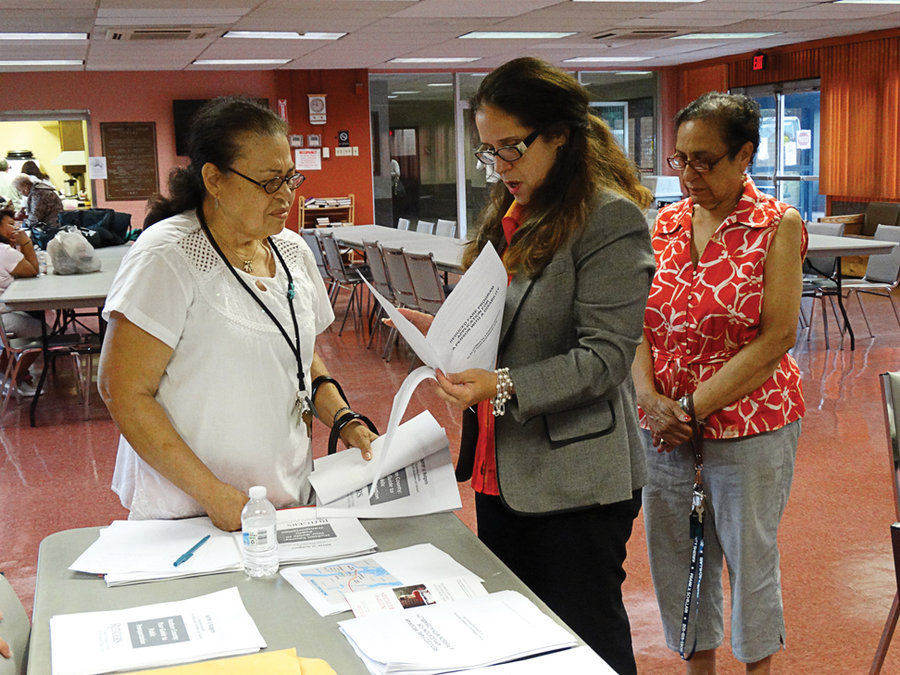The name says it all: the New Jersey Transportation Independence Program, or NJTIP. The nonprofit organization provides educational assistance to Jersey residents on how to travel around the region on mass transportation. Recently, representatives of NJTIP visited the Edward A. Lawler Towers senior building in North Bergen to offer a seminar on how to use public transit.
Marta Zapoznicoff is a feisty widow, set in her ways, and they don’t include buses or trains. “I don’t use public transportation,” she said emphatically. “If I want to go somewhere, I call a taxi. Because I’m an old woman. I’m a senior. I call Anthony, the taxi driver.”
Mildred Peterson, a Lawler resident, admitted she is reluctant to take public transportation. “I’m not a traveler, really,” she said. “I have a phobia about going on buses. I’m scared. There are a lot of crazy people out there.”
NJTIP, a nonprofit community service organization, offers seminars, field trips, and one-on-one sessions to provide instruction on using public transportation in Hudson County.
____________
Peterson and Zapoznicoff were among a small group of residents who attended the bilingual seminar, one of an ongoing series of life-improving sessions offered by the municipal Social Services Department headed by Kathy Paletta.
Field trips and one-on-one sessions available
The seminar featured discussions and handouts on various aspects of transportation, including buses, trains, light rail, ferry, and the PATH, as well as information on travel safety and reduced fare options for persons with disabilities.
And that’s just part one. “The second part is, we take them out on a field trip,” said Pimienta. “We do hands-on with everything that was discussed. How to advocate for yourself. How to request a lift if you need it. How to request a bus to kneel. How to figure out your fare. How to read a schedule.”
Field trips are limited to 15 attendees or less, with two instructors. “We go to a destination they’ll most likely be going with some type of frequency, like a mall, or Hoboken,” said Pimienta. “It’s based on their community and what’s in the proximity. We scout the area to see the different challenges they may encounter, like if it’s too steep to get to Kennedy Boulevard, or if there are sidewalks, because maybe someone comes who has a walker. We see the challenges in the environment and we try to pick the best route for them.”
The whole trip is explained in advance. Then the travelers are required to buy their own tickets and travel independently under supervision.
NJTIP also offers one-on-one sessions. “That means if a person needs concierge service or needs more detailed information for a specific destination, let’s say to go to church, we actually sit down with them,” said Pimienta. “We plan it and we go out with them.”
Open to all
The program was piloted in 2005 by NJ Transit and spun off into the independent nonprofit NJTIP In 2008. In 2013, it joined with Rutgers as part of the Edward J. Bloustein School of Planning and Public Policy.
NJ Transit still funds the one-on-one training, while the other portions of the program are federally funded. NJTIP currently operates in 13 counties in northern and central Jersey. “We initially selected which counties were involved by looking at transit density,” said Program Manager Louis Hoffman. “We looked for high populations of seniors and people with disabilities.”
“The priority of the federal funding is people with disabilities getting to work and seniors getting to life-sustaining destinations,” he continued. “But it’s not limited to people with disabilities and seniors. Our group sessions are open to the public.”
Sessions are planned for the fall in the other senior buildings in North Bergen. The public is free to attend. For more information or questions call (848) 932-4499 or email njtip_info@njtip.rutgers.edu. The website is njtip.rutgers.edu.
“We focus on people with disabilities and seniors, but if you call me and you have a question, I’m not going to turn you away,” said Pimienta. “I will help you over the phone.”
Art Schwartz may be reached at arts@hudsonreporter.com.
